- Iterate
- Meet The Team
- The Top 10 Startup Teams in Denmark 2020
The Top 10 Startup Teams in Denmark 2020
Table of contents
Home to the world’s (second) happiest people, where bicycles outnumber cars and no point on land is further than 50 km from the sea, is Denmark.
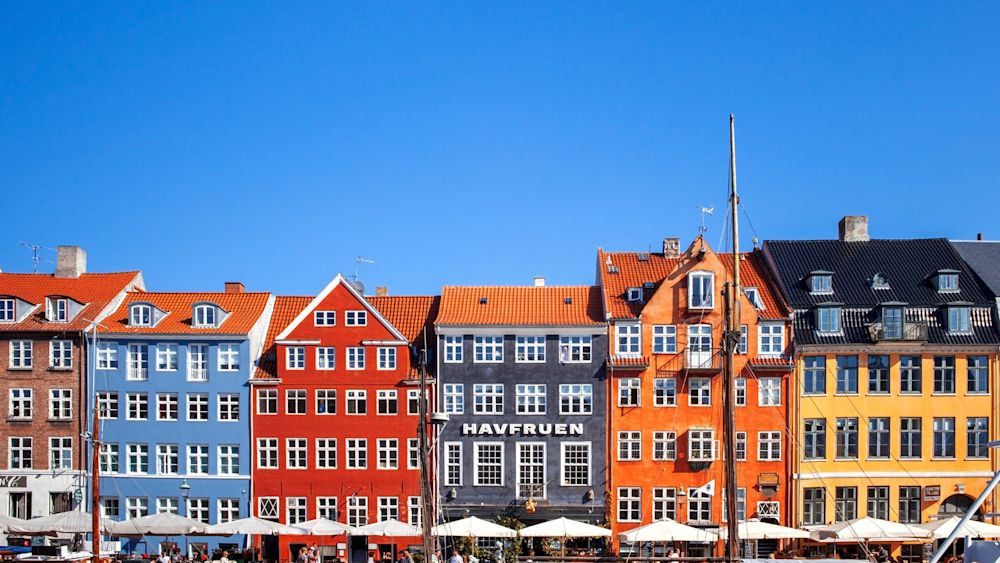
Home to the world’s (second) happiest people, where bicycles outnumber cars and no point on land is further than 50 km from the sea, is Denmark.
In the last decade, Denmark’s startup ecosystem has gone from nearly non-existent to thriving. With Unicorns such as Unity, Sitecore, Tradeshift and Zendesk paving the way, the country can boast of an impressive number of startup success stories and notable “Soonicorns” like Trustpilot, Pleo, Peakon and Lunar.
Just as noteworthy is the development taking place at the early stages, “Denmark has a strong early stage startup scene, with many promising new startup teams” says Neil Murray, founder of The Nordic Web Ventures. “We are seeing many repeat entrepreneurs and employees from former successful startups starting their own company. It’s a sign of maturity in the ecosystem – the confidence is much higher now than it was just a couple of years ago.” says Murray.
Currently ranked as the best entrepreneurial ecosystem in Europe – and fourth best in the world – according to the Global Entrepreneurship Index, Denmark seems to stand out as an attractive destination for entrepreneurs. But, just like the rest of the Nordic countries, Denmark is still in need of more diverse talent, “There are so many good startups in Denmark presently, with great ideas and execution, especially in SaaS. But we lack diversity in talent. We need more people realizing the virtues of working in Denmark.” says Nico Blier-Silvestri, co-founder of Platypus, number one on our list.
“SaaS with a B2B model” describes a majority of Danish startups. Thanks to the number of successful startups solving tedious back-office pain points it has even (however lovingly) been called “The Boring Country”.
That being said, the startups highlighted in this article are anything but boring. After reviewing over 60 worthy contenders, we have picked out 10 teams that we feel deserve some extra time in the limelight. In addition to impressive growth, traction and concept, the startups have been selected based on their exceptional teams.
There is no one right way to organize or build a team, and the startups highlighted in our list excel in their own way – be it in terms of a great culture, a remote work setup, inspiring diversity or novel hiring processes.
Here is our list of the top 10 startup teams in Denmark:
1. Platypus
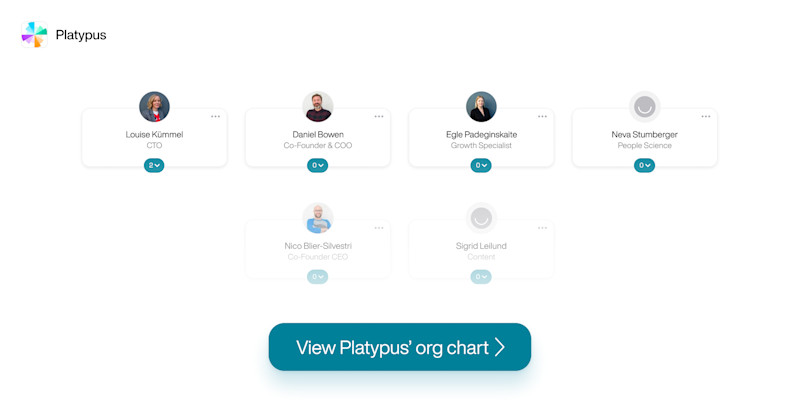
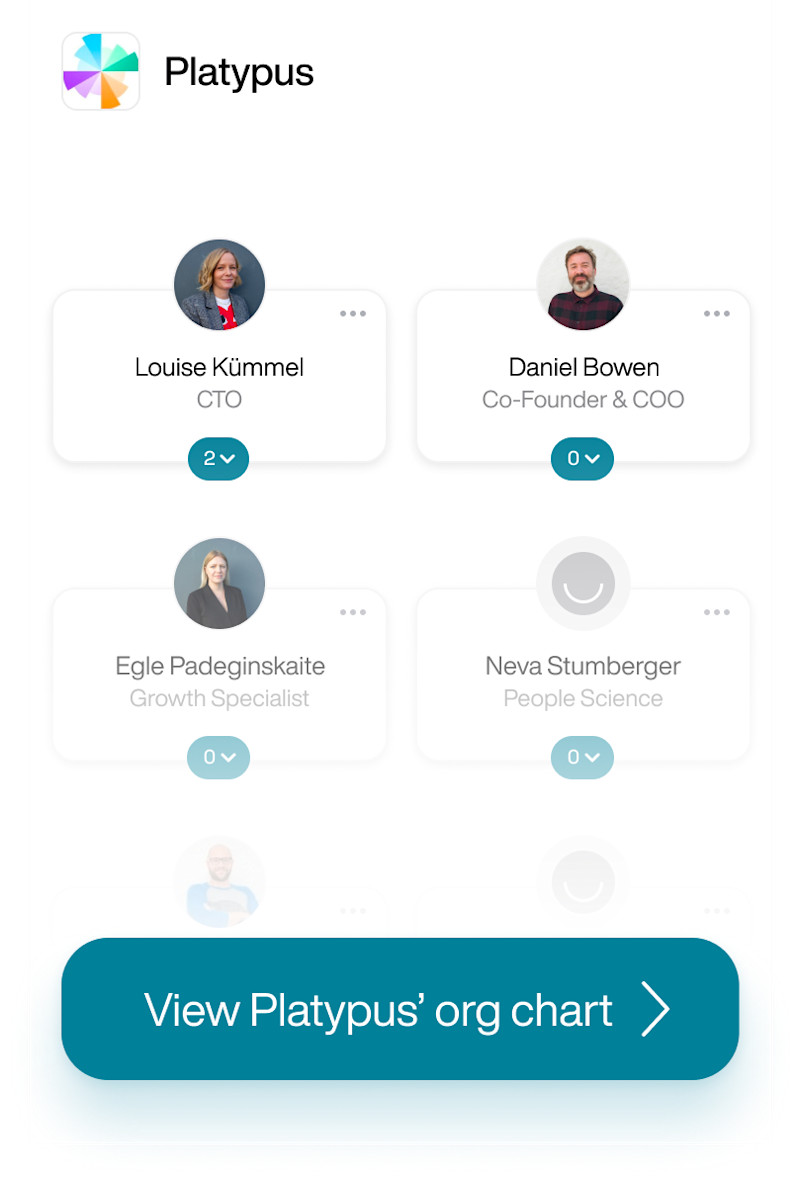
With its data-driven HR solution, Platypus helps companies discover what their employees value at every stage of the talent lifecycle, from attraction, to management, to retention.
Founded in February 2019 by Nico Blier-Silvestri and Daniel Bowen, Platypus is accelerating its early-stage growth with its recent raise of € 2.3 million - including investors such as Mustard Seed MAZE, Inventure, Vækstfonden, The Nordic Web Ventures and Unity co-founder David Helgason.
The Copenhagen-based startup is one of the most diverse and multicultural teams on our list with their 17 team members coming from 11 different nations. “We know from experience that multicultural teams simply perform better” explains CEO Nico Blier-Silvestri, who himself has over 15 years of experience in managing HR functions in successful startups such as Revolut, Unity Technologies, Peakon and Trustpilot.
“We are very proud to have a team that is 50:50 male-female, including our badass female CTO. It's not something to take for granted in the tech world”, Blier-Silvestri adds. “When starting this company we were also very aware that we were two white dudes in their 40s, it was very important to us to not be a company of just men.”
Adding to their multicultural and diverse team, the Platypus founders have a high emphasis on building a transparent organization. Including using their own tool to improve recruitment, culture and retention, they have a flat organizational structure and give all employees equity in the company. With their newly raised round and the next version of their HR tool en route, Platypus is fast on its way to help yet more companies improve their culture.
2. Labster
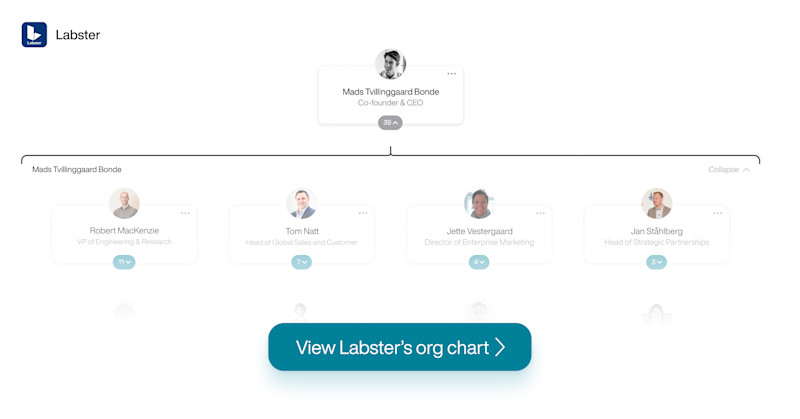
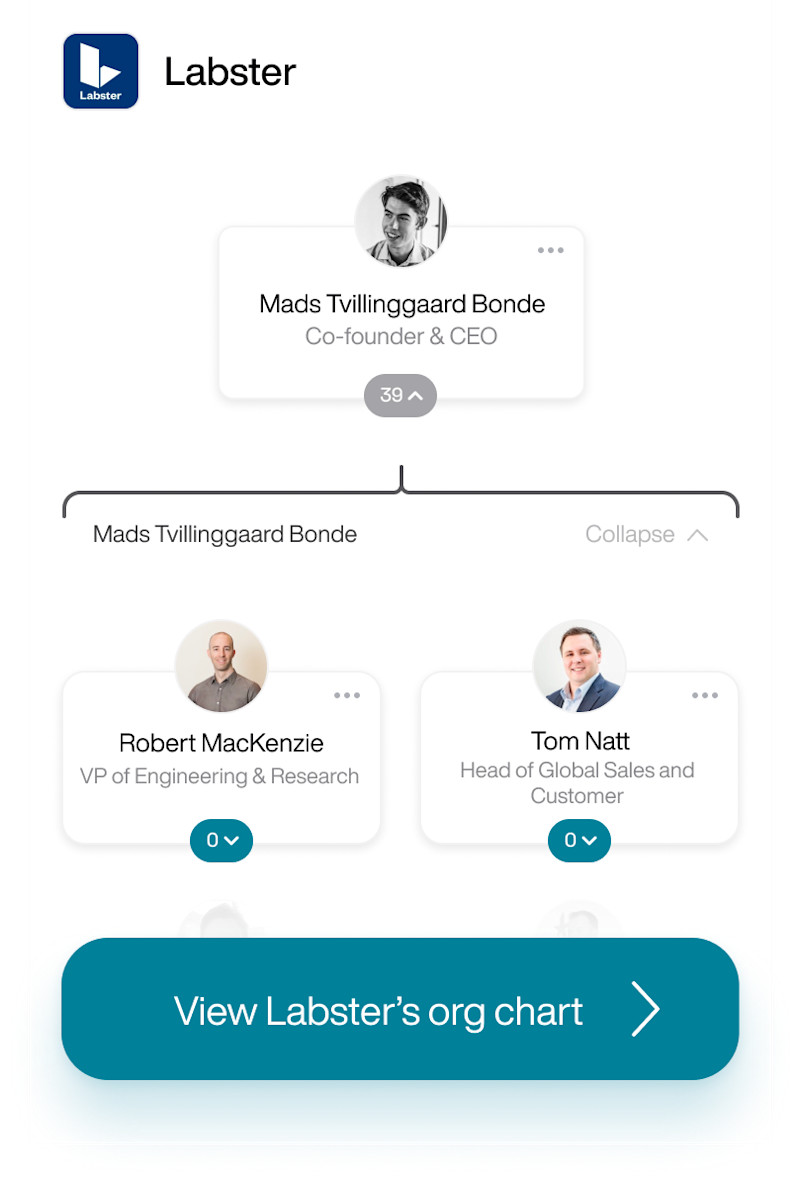
As the startup’s name hints at Labster is about labs, but their take on them is an entirely new one.
Launched in 2013, Labster develops fully interactive and advanced lab simulations powered by VR. Their simulations allow students to perform experiments in biology, chemistry, physics, engineering and general sciences – without the risk of the occasional explosion or chemical spill. Their virtual labs are already being used by several hundred universities and high schools around the world, including Harvard, MIT, University of Hong Kong and Berkeley, to name some.
Labster boasts an impressive list of investor backers. With its Series B round in 2019, the startup raised $21M from Owl Ventures, Balderton Capital, Northzone and Swisscom Ventures. Previous backers such as Nordic Makers and David Helgason also followed on, bringing the total raised by the company to date to $35M.
With a diverse staff throughout their offices in Denmark, Switzerland, the US and Indonesia the team is united in their mission of radically improving science education.
“We have a dream that a Nobel laureate will go on stage in ten years having cured a disease or solved the problem of global warming, and as part of their speech they thank Labster for inspiring them to believe in their ability to solve important challenges and for giving them the skills and tools needed. That’s the motivation that drives us. ” says CEO and co-founder Michael Bodekaer Jensen.
3. Pento
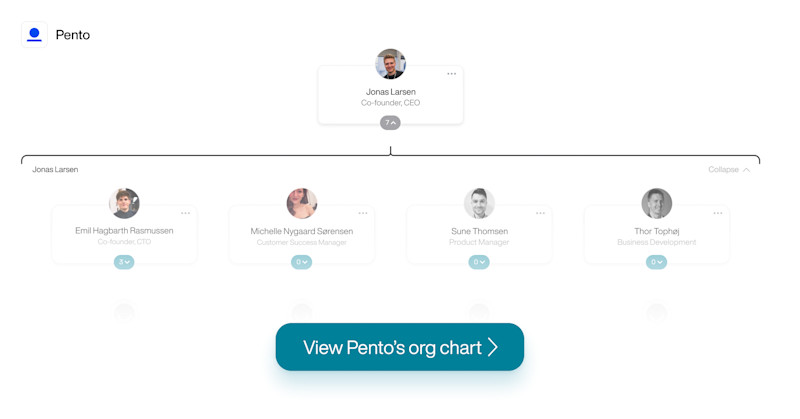
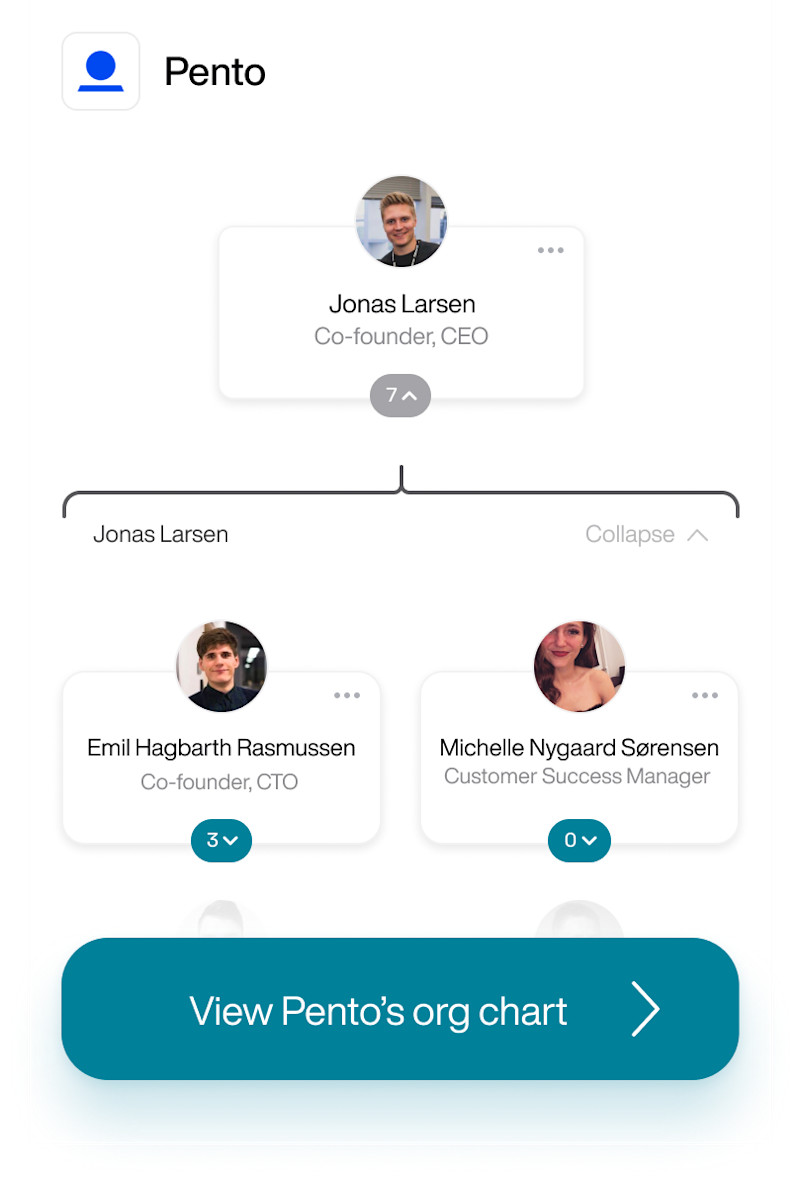
Pento is on a mission to make payroll more efficient and automated for companies, and more flexible and transparent for employees. The company already caters to over 1000 companies in Denmark and (increasingly) the UK, with their last round of $2.8M including investors such as Point Nine Capital, Seedcamp, Moonfire and Futuristic.vc.
Remote work has been a frequent topic of discussion these last months, and many teams have had to implement new ways of operating during this pandemic. For the Pento team however, working remotely has been the standard since the very beginning;
When founding Pento in 2016, Jonas Bøgh Larsen and Emil Hagbarth Rasmussen lived on either side of the Atlantic. Then they went on to hire their first engineer, in Portugal. Today Pento is a team of 14 people, with five in Copenhagen, two in London, and the rest of the team distributed across seven countries.
“Working remotely brings a lot of benefits in terms of flexibility, travel and deep focus time.” says CEO Jonas Bøgh. He points out that to work well and build trust they measure output and not time: “We make a point of not micromanaging or counting hours. We agree on a task and a time to catch up and trust the person to get it done. It leaves a lot of responsibility with the individual, which creates a lot of trust over time.”
Curious to learn more on how to operate remotely? We recommend checking out Pento’s public Notion page 💡
4. Develop Diverse
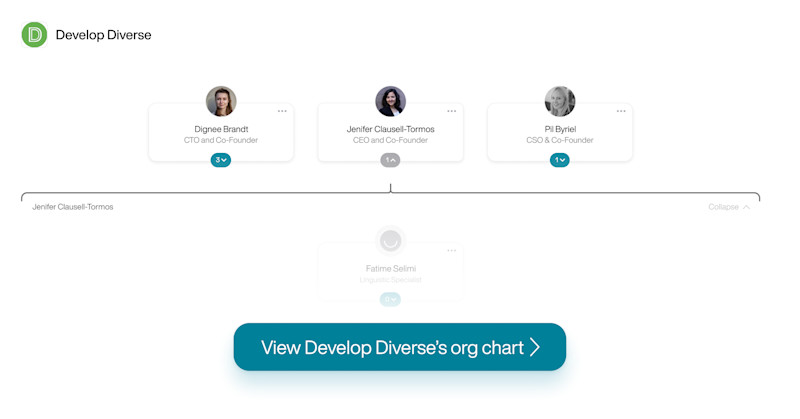
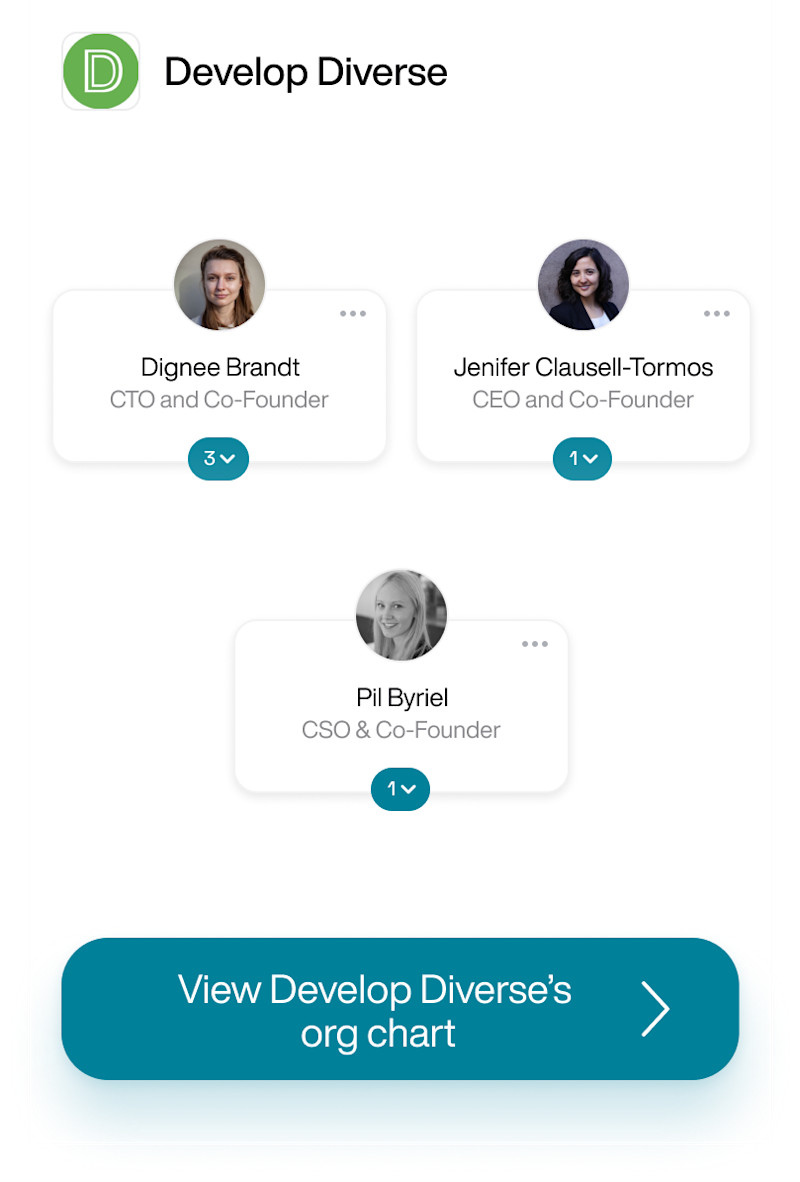
With a team of specialists in linguistics, sociology and programming, Develop Diverse is on a mission to normalize diversity in companies to create equal opportunity. Since its founding in 2017 the team has developed the world’s first software tool that automatically analyses non-inclusive content for gender, age and ethnicity in texts and proposes inclusive alternatives.
Who’s their newest customer you ask? Amazon. Coming on board after Develop Diverse provided them with a 3x increase in diverse qualified applicants. Even with limited funding the startup has increased their monthly recurring revenue drastically from €500 to €10K in the last few months. With their current Seed investment round in its final stages, Develop Diverse is making solid progress on helping companies reach a wider and more diverse talent pool.
The startup is true to its mission with its own multicultural and gender balanced team – including its three female co-founders. CEO Jenifer Clausell-Tormos is keenly aware of the unconscious biases that can influence a hiring process, and applies this knowledge when hiring for Develop Diverse as well: “When evaluating a potential employee I do not ask them to provide any private information - be it age, nationality, family or hobbies – because I know that information can influence my perception and decision making. What I look for and evaluate is the person's motivation and skills.”
5. Seaborg
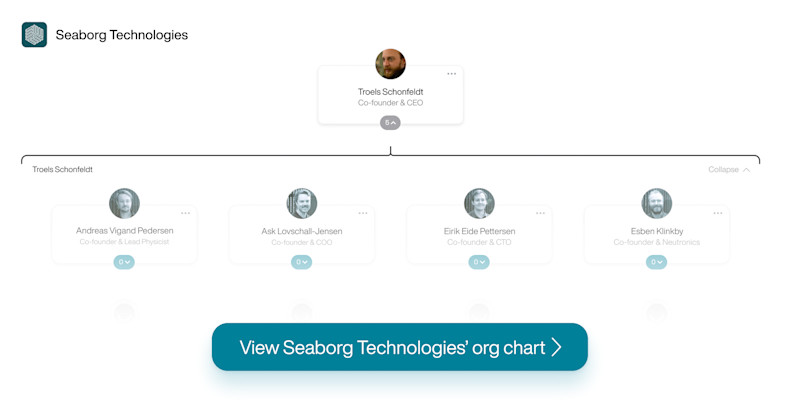
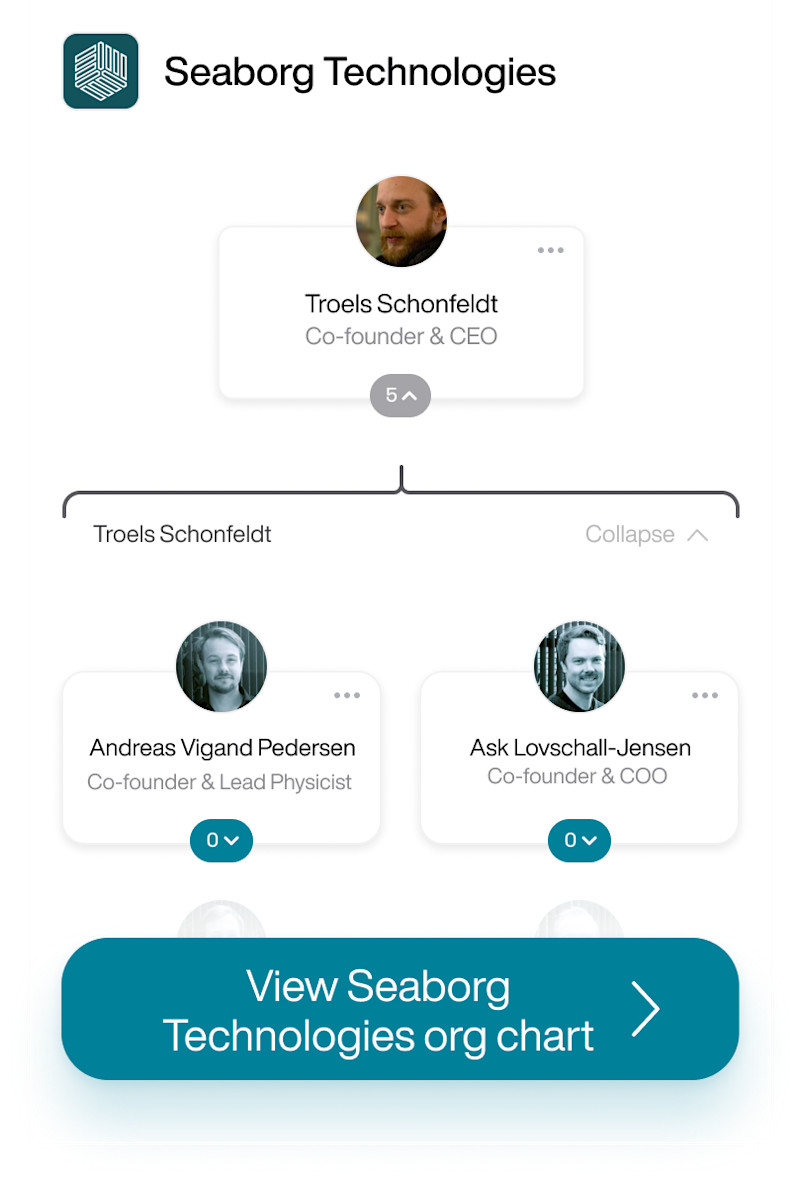
Seaborg is rethinking nuclear power. The startup is developing a nuclear reactor fundamentally different from what exists today. Put simply, they are on a mission to save the world – making nuclear an inexpensive, sustainable and safe technology that can out-compete fossil fuels and revolutionize energy markets.
To realize this awesome yet non-trivial task, Seaborg’s team includes highly specialized people such as nuclear engineers, chemists and physicists – most with a PhD in hand already. Their 30 plus team members have moved to Copenhagen from all around the world, coming from five different continents.
“Seaborg consists of people with extraordinary vision and guts. To realize our goal we need time and money, but most of all we need exceptional people. Our team is our most important IP.” says CEO Troels Schönfeldt.
Founded in 2015 and with their third funding round in 2019, Seaborg is already reaching milestones on their path to sustainable and cheap nuclear power.
6. Paralenz
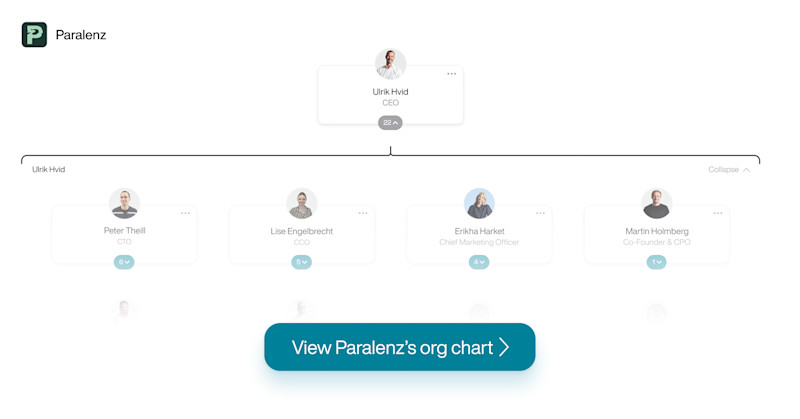
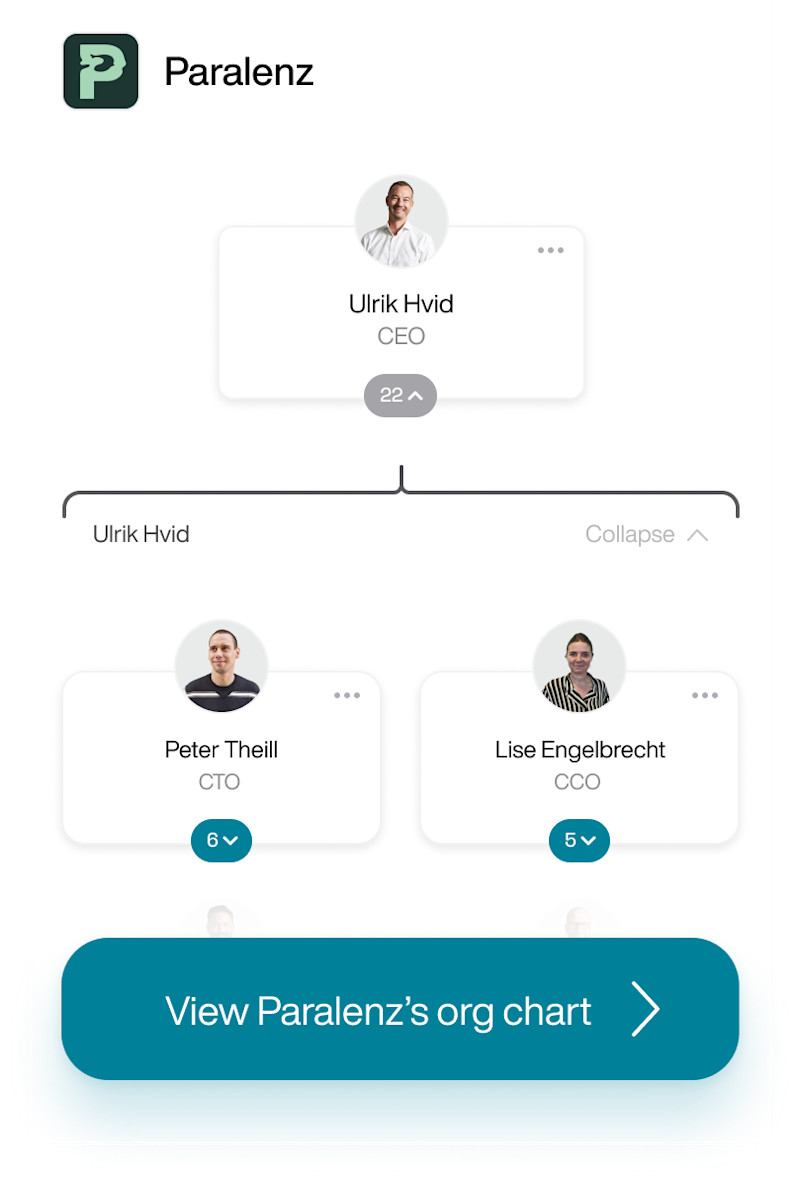
With a dream of creating an action camera for divers, Paralenz got off to a flying start when they launched their Kickstarter campaign in 2016. In just 10 days they raised $300K - 600% of their initial funding goal. The interest from the diving community was evident, and they went on to develop the camera further together with 250 divers from 38 countries.
Since then, Paralenz has raised a $4M funding round (they also received $225K from the Danish Innovation Fund just this week💪) and grown to a team of 23 full-time employees. Together with their freelancers and specialists they come from 13 different nations. As CMO Erikha Harket explains “Diversity has been a key element in building the team. As a global ocean company, we know we are at our best game when we utilize each others’ differences instead of just tolerating them. It also helps us become relevant to different corners of the world from the get go.”
Diving and the ocean are at the heart of this startup’s culture: “We are offering a dive certificate course to all of our employees who don't already have one. It’s to remind ourselves why we are in business: By and for the Ocean and all in it. Some of our employees are hardcore divers, and others are vacation snorkelers or occational skinny dippers,” says Harket.
Paralenz believes in diving with a mission. The ocean is gravely affected by the changing climate and its regeneration is heavily dependent on scientific research and an increased awareness of the mounting threats facing aquatic life. By developing their products and engaging with their community, Paralenz wants to confront environmental indifference and inspire people to speak for the ocean – as a seamless part of the dive. The startup has also partnered up with several ocean conservation organizations to share data captured and documented by their cameras.
7. CanopyLAB
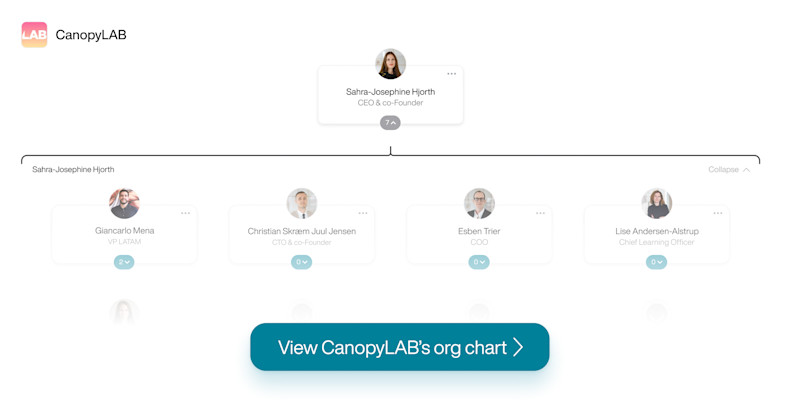
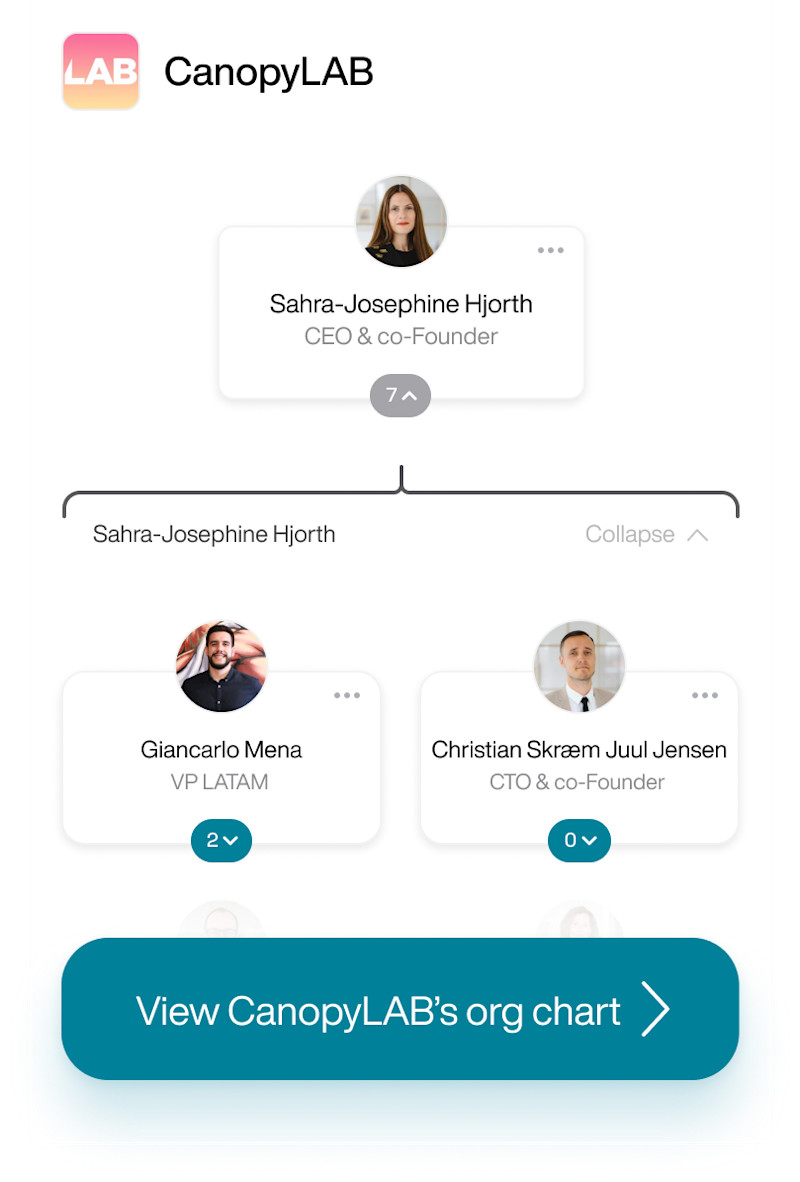
This rapidly growing EdTech startup is on a mission to change the way we learn. The CanopyLAB platform combines strong social interaction with AI-boosted adaptive learning programs. A particular focus is on meeting the 21st-century skills gap.
The idea of CanopyLAB was conceptualised by CEO Sahra-Josephine Hjorth while writing her PhD – focusing on virtual learning environments, social media and empowerment through learning. First founded in 2015 together with Christian Skræm Juul Jensen, the CanopyLAB team already spans three continents with their Hvidovre HQ, a team in Ho Chi Minh and six new teammates in Lima, Peru. Notably, the team has an equal gender split.
“Our software is used by a wide range of companies, spanning from media companies in the Nordics to refugee camps in Africa. Having a diverse team in terms of age, gender and ethnicity, ensures that we don’t have any blind-spots when it comes to the product,” says CEO Sahra-Josephine Hjorth.
The culture at CanopyLAB has been influenced by the concept of radical candor, where giving and receiving honest feedback is essential. Over the past five years they have also shifted their hiring priorities, going from generalists to specialists and from hiring young professionals to favouring experienced professionals and former entrepreneurs.
On this shift, Hjorth reflects “Hiring more senior staff is exciting because they elevate the collective level of skills and competencies from the get-go. We also focus more on hiring people who find the role they are stepping into the most exciting position they could imagine, and not people who view it as a stepping stone to something else.”
8. MakerDAO
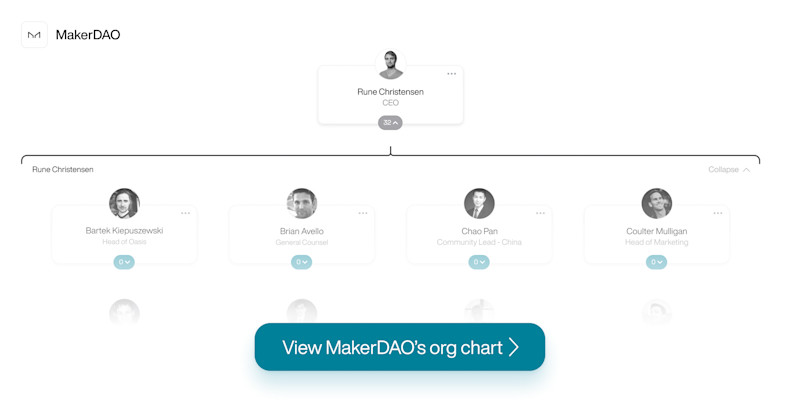
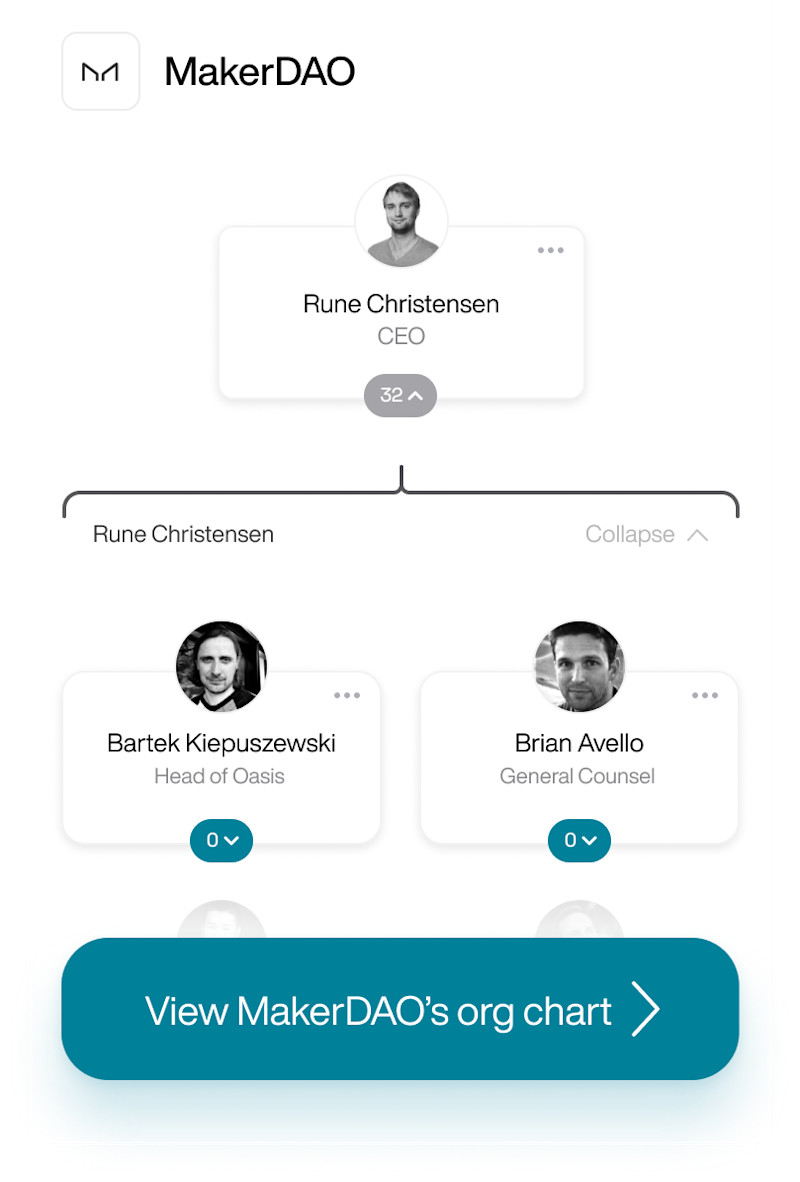
MakerDAO is behind the Maker Ecosystem and Maker Protocol, one of the most widely used distributed applications on the Ethereum blockchain.
The ecosystem created by MakerDAO is behind a stable cryptocurrency called DAI, which is built to fully function as a replacement to current fiat currencies. DAI is made useful by its very stable value, in contrast to most other cryptocurrencies; Any company or individual can use DAI for trading, borrowing or saving purposes.
"Behind MakerDAO is a fantastic and unique group of people. We are diverse in backgrounds and skills, but we are all driven by the mutual goal of providing equal access to finance on equal terms for everyone. " says CEO Rune Christensen.
MakerDAO is far from the traditional organisation – DAO itself stands for distributed, autonomous organisation. Started as an open-source project in 2014, the DAO team is the core leadership, business development and community management responsible for improving the Maker ecosystem and keeping it true to its original purpose. Adding to their distributed organisation: Their MKR tokens afford any holder the right to vote on changes in the system, and to date there are thousands of MKR holders in existence.
MakerDAO has raised a significant amount of investments to fuel its growth. After initial early investments amounting to around $3M, in 2018 the venture firm Andreessen Horowitz purchased 6% of the voting power-controlling MKR tokens for $15M. In 2019 Dragonfly Capital and Paradigm paid $27,5M for 5,5% of the MKR tokens.
9. Brain+
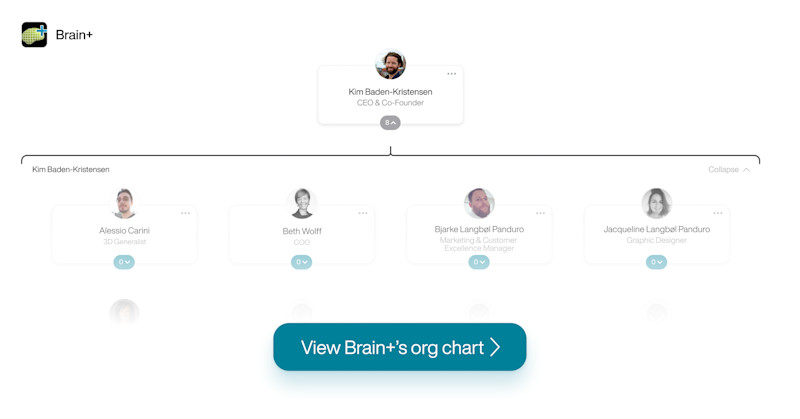
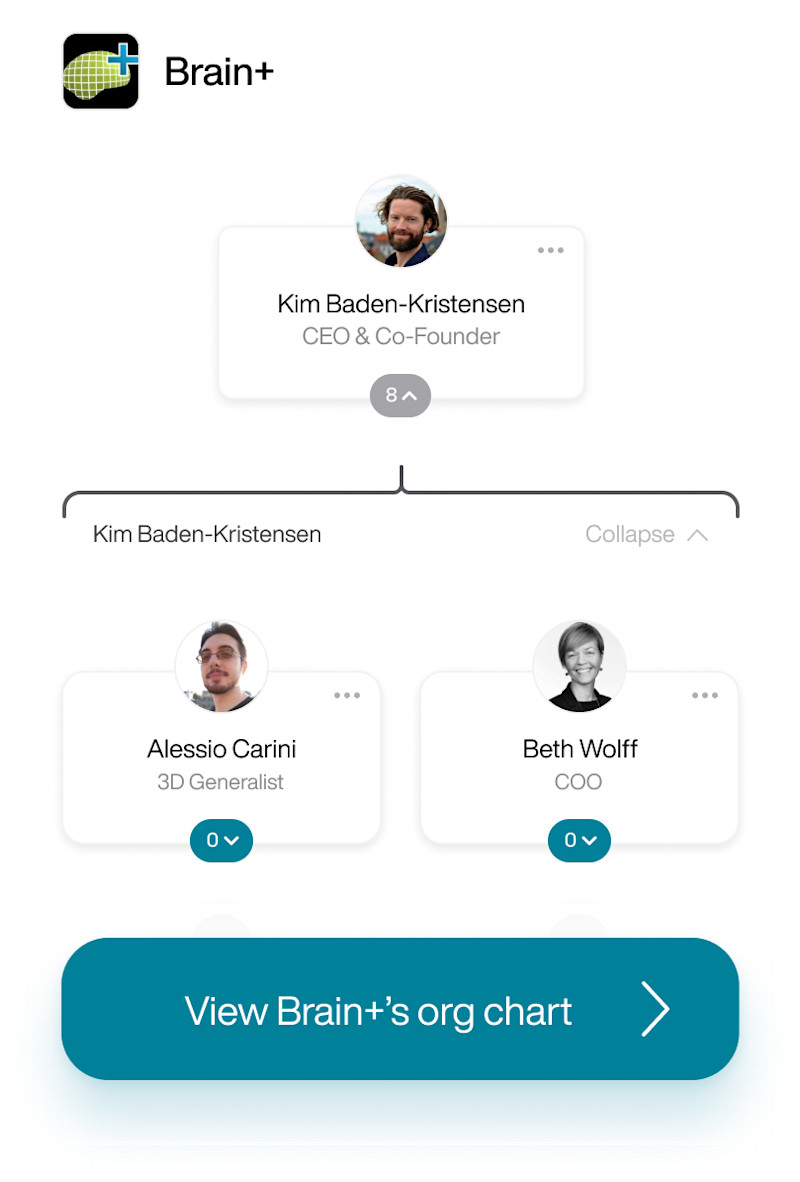
Brain+ has developed an evidence-based, gamified digital platform and multiple digital therapeutics products for early detection, prevention and treatment of brain disorders.
They are a mission driven team of 20: “We are working to create a culture that helps every team member grow, thrive and be increasingly impactful over time. We try to find the perfect balance of structure and very high degrees of flexibility and responsibility. Probably 40-50% of the time team members are working remotely for example. Centrally to our way of operating is to value, respect, nurture and care for people, both in the team and outside the team.” says CEO Kim Baden-Kristensen.
Enjoying solid growth and traction, the Brain+ team is working with universities and research organisations across Europe to expand our knowledge of the brain. The potential impact of Brain+ is evident: Early studies are taking place into the product’s efficacy to treat Parkinson’s disease, Alzheimer’s and acquired brain injuries and other brain disorders.
During Covid-19 Brain+ has also made their remote-treatment-friendly brain rehabilitation free of charge for all health professionals and citizens.
10. Vivino
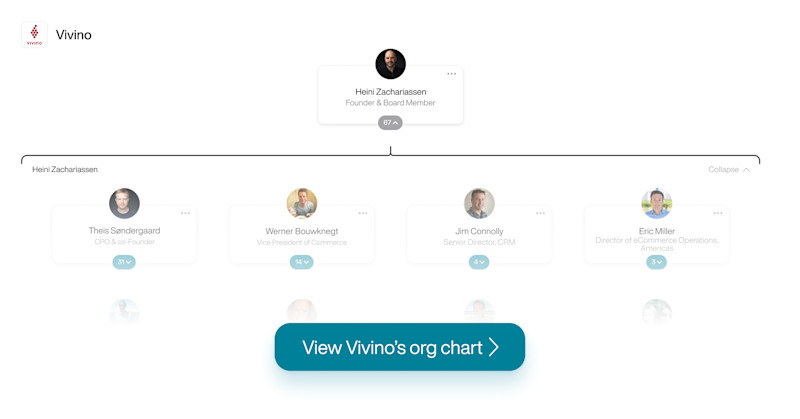
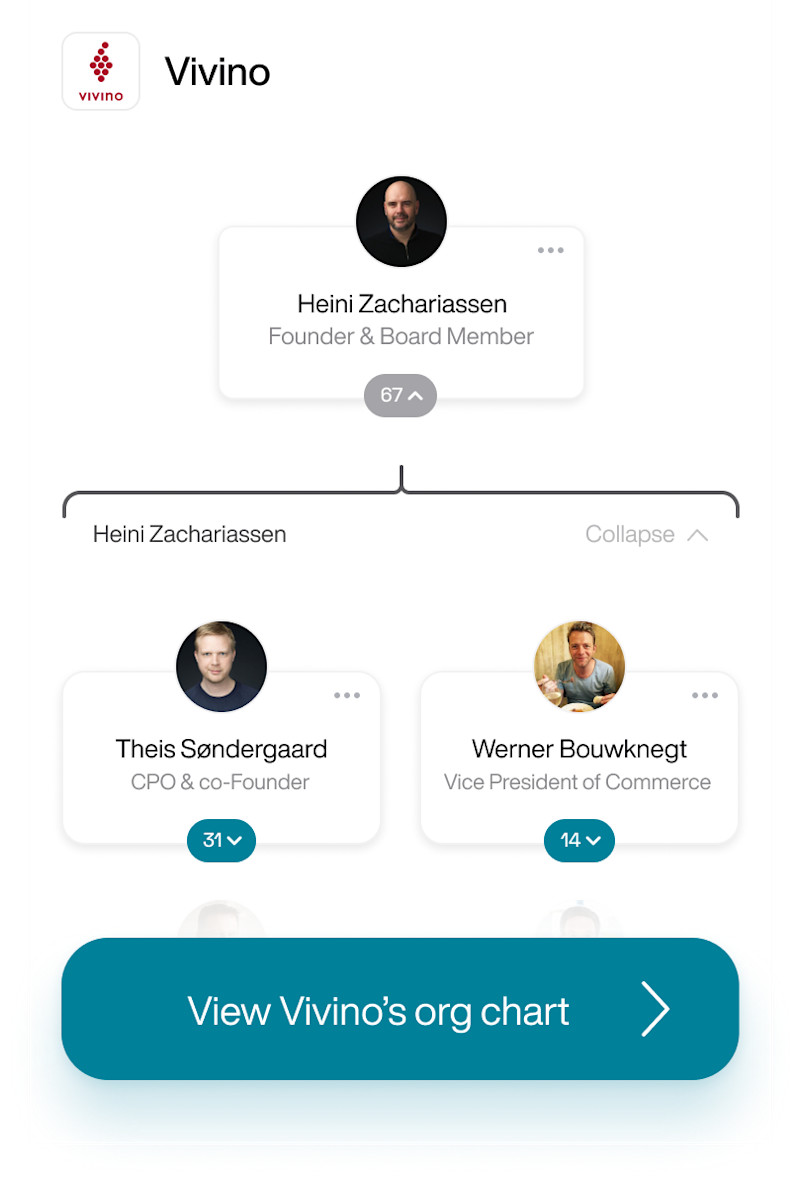
Have you ever found yourself at the supermarket in front of a wall of wine trying to figure out which is good or bad? If you are one of Vivino’s 43,984,266 users, you have likely found the solution to this problem already.
Founded in 2010, Vivino has grown to become the world’s largest online wine marketplace and most downloaded wine app. With their first investment from Skype co-founder Janus Friis, the startup went on to raise rounds from Seed Capital, Creandum, Balderton and more. Their series C round in 2018 amassed the company’s total funding to $72 M.
Vivino is the most senior startup on our list, but just like any great wine we dare to say the startup has aged well. The team has managed to build and maintain a great company culture since its inception ten years ago, currently employing 130 people located in San Francisco, Copenhagen, Ireland, UK, Netherlands, Italy, Spain, Germany, France, and Hong Kong.
“Vivino's success is because we hire the smartest people who match our cultural values - we have a team of independent thinkers who align with our mission - our why - and that is certainly the key to our success. Our values largely center around trust, transparency, and approachability. The wine world has long been associated with snootiness, and it’s not a reputation that’s entirely unfair. We are for empowering each other and our customers and are against snobbery.” says the founder Heini Zachariassen.
--
There is an impressive amount of exceptional startup teams coming out of Denmark these days, and narrowing down this list to 10 teams was no easy feat.
Some of the startup teams that made it high on our rankings and that still deserve an honorable mention here are: Neurescue - pioneering a breakthrough cardiac arrest treatment with their new intelligent catheter device, Portchain - effectively alleviating the shipping industry of some of its biggest headaches, Templafy - defeating document anarchy by providing employees anywhere-access to company standard content and CathVision - who empower cardiologists to cure arrhythmia.
The list of great startup teams in Denmark goes on, but ours is at its end.
Do you agree with our list?
Should your company have made this list? Join or create your company on The Org or send us an email at hello@theorg.com. We want to hear your feedback, comments and suggestions!
In this article


The ORG helps
you hire great
candidates
Free to use – try today